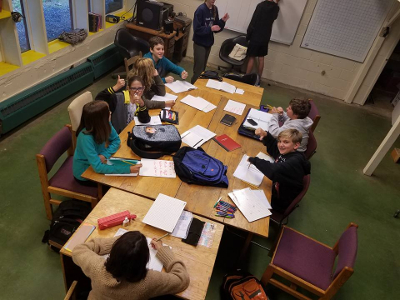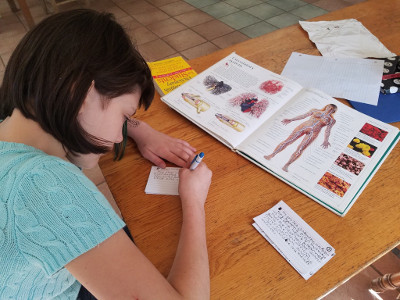The Pros and Cons of Technology in the Classroom

Technology is a complicated issue for many teachers. Educational apps, documentaries, and podcasts, provide valuable and fun learning experiences. However, the frequent use of technology often leads to less interaction between students and may causes a reliance on computers. Just ask any middle school math teacher.
The calculator, the most basic form of technology, causes all sorts of issues when introduced into the classroom. Suddenly students question why they should bother learning fractions or long division when they can get the answer just by typing it into their phone. Access to technology creates many questions for students about why they should learn basic skills. They suddenly see these lessons as a waste of their time or busy work.
The Argument over Technology
 As teachers, we understand that the internalization of these basic skills will better prepare our students for their academic future. However, that can be a hard sell to students who often see their phone as an extension of themselves. The argument that technology leads to a degradation of community is also difficult to make. As they witness many adults just as addicted to their phones or computers, they wonder why they should be different. In a culture where technology is available almost everywhere, when and why will they ever need to function without it?
As teachers, we understand that the internalization of these basic skills will better prepare our students for their academic future. However, that can be a hard sell to students who often see their phone as an extension of themselves. The argument that technology leads to a degradation of community is also difficult to make. As they witness many adults just as addicted to their phones or computers, they wonder why they should be different. In a culture where technology is available almost everywhere, when and why will they ever need to function without it?
Banning Technology
For many teachers, the answer has been to simply ban it. Sometimes they use the patronizing argument that students will appreciate it when they get older. Another tactic is to summon up nightmare visions of a post apocalyptic world where electricity is obsolete. Regardless, the message is the same: leave their phones, calculators, or computers at home.
 Unfortunately, this has some negative effects. For one, banning technology turns it into a forbidden fruit. Students crave it even more just because they’ve been told they aren’t allowed to have it. As a result, when they do get access to technology, they do an even worse job of regulating their use of it. Another argument against banning technology is that not using it cuts off many valuable learning opportunities. Learning to word process or research a topic online are important skills that many middle schoolers will need once they start high school. If they don’t learn them in middle school, they will be at a disadvantage later on.
Unfortunately, this has some negative effects. For one, banning technology turns it into a forbidden fruit. Students crave it even more just because they’ve been told they aren’t allowed to have it. As a result, when they do get access to technology, they do an even worse job of regulating their use of it. Another argument against banning technology is that not using it cuts off many valuable learning opportunities. Learning to word process or research a topic online are important skills that many middle schoolers will need once they start high school. If they don’t learn them in middle school, they will be at a disadvantage later on.
Technology Talk
So what is the answer? How can teachers incorporate technology into their classrooms while tempering its use before it takes away from their students’ education? At Arthur Morgan School, students and staff wrestle with this question a lot. Being a small boarding school that prides itself on the idea of community, technology is sometimes labeled as an enemy. They describe it as a potential barrier between people that stops us from interacting. At the same time, they rely on its use quite a lot. Researching personal projects online, watching documentaries, staying up with current events all mean needing access to technology on a daily basis.
Learn more about our academic program!
How do they navigate this difficult balance? By constantly examining their use of it. Technology is a common topic of conversation at AMS. Not because the students are obsessed with it, but because they are trying to navigate their use of it. The topic of technology is a regular one in the school’s All School Meeting. Students are tasked with setting up rules for themselves. For instance, last year they banned YouTube videos outside of classes because it lead to people ignoring one another. The school also offers many courses that examine society’s use of technology. Language arts, history, personal growth, and even science classes often look at how media affects our culture and our bodies.
Striking a Technological Balance
 Some technology is banned at AMS. Students are not allowed to have cell phones or any personal devices that support apps. These technologies are seen mostly as forms of entertainment or personal distractions. They make people focus inward instead of on the people around them. The school describes technology as tool, something that can help people learn if used correctly. They are taught to see their use of it as a personal, conscious decision, one they need to make for themselves on a regular basis.
Some technology is banned at AMS. Students are not allowed to have cell phones or any personal devices that support apps. These technologies are seen mostly as forms of entertainment or personal distractions. They make people focus inward instead of on the people around them. The school describes technology as tool, something that can help people learn if used correctly. They are taught to see their use of it as a personal, conscious decision, one they need to make for themselves on a regular basis.
By understanding the consequences of using technology and seeing its use as a personal choice, it is sometimes easier to draw the line between what uses are positive and which are negative. The students can ask themselves, “Am I using this technology because it is helping me learn something or am I doing it because I am bored or lazy?” If the answer is the former, they let themselves use it. If it’s the latter, they try to find another way to do it. Through this self reflection, they will be more equipped to regulate their technology use and interact with it on a positive level.
-by Nicholas Maldonado
